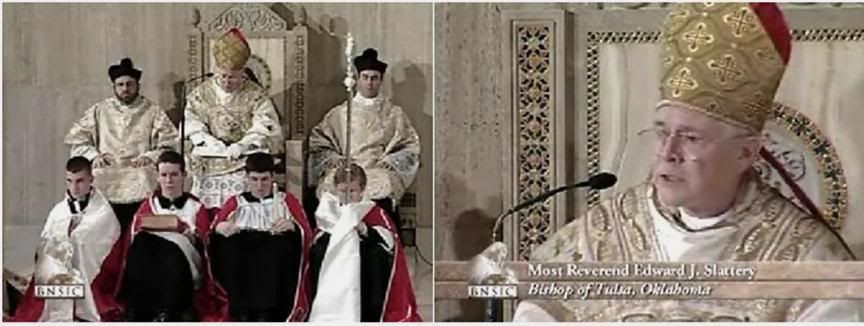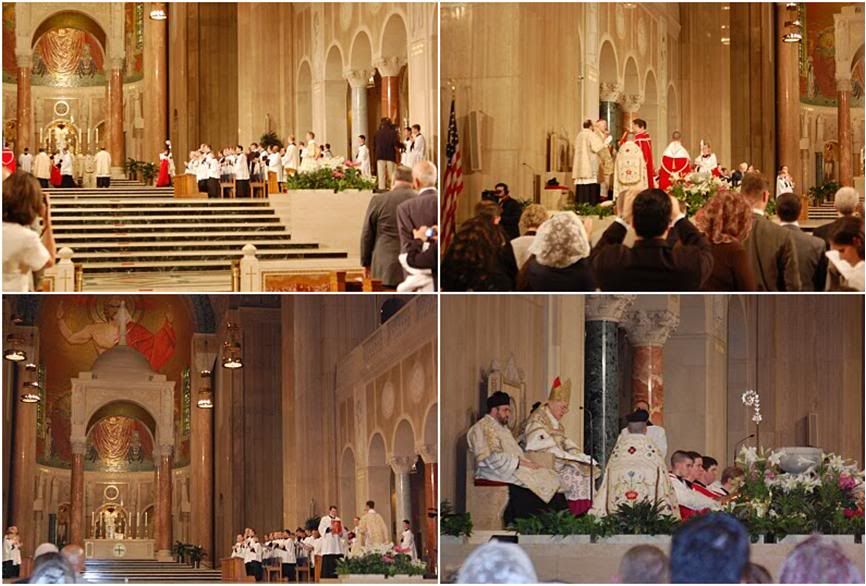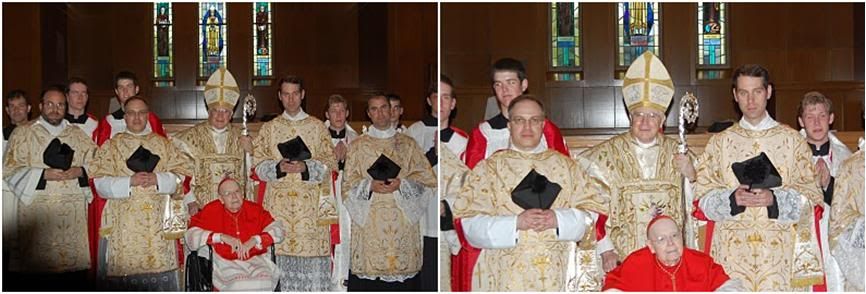| | | OFFLINE | | Post: 20.037
Post: 2.678 | Registrato il: 28/08/2005
Registrato il: 20/01/2009 | Administratore | Utente Veteran | |
|
 Thanks to Father Z, finally, the text of the splendid homily delivered by the Bishop of Tulsa, Mons. Edward Slattery, at the Pontifical Solemn Mass in Washington, DC, sponsored by the Paulus Institute to mark the fifth anniversary of Benedict XVI's Pontificate. It is very much a Benedict-ian homily.
ON THE HOLY FATHER'S FIFTH ANNIVERSARY:
Thanks to Father Z, finally, the text of the splendid homily delivered by the Bishop of Tulsa, Mons. Edward Slattery, at the Pontifical Solemn Mass in Washington, DC, sponsored by the Paulus Institute to mark the fifth anniversary of Benedict XVI's Pontificate. It is very much a Benedict-ian homily.
ON THE HOLY FATHER'S FIFTH ANNIVERSARY:
The mystery of suffering
by Mons. EDWARD SLATTERY
Bishop of Tulsa, Oklahoma
April 24, 2010

We have much to discuss – you and I - much to speak of on this glorious occasion when we gather together in the glare of the world’s scrutiny to celebrate the fifth anniversary of the ascension of Joseph Ratzinger to the throne of Peter.
We must come to understand how it is that suffering can reveal the mercy of God and make manifest among us the consoling presence of Jesus Christ, crucified and now risen from the dead.
We must speak of this mystery today, first of all because it is one of the great mysteries of revelation, spoken of in the New Testament and attested to by every saint in the Church’s long history, by the martyrs with their blood, by the confessors with their constancy, by the virgins with their purity and by the lay faithful of Christ’s body by their resolute courage under fire.
But we must also speak clearly of this mystery because of the enormous suffering which is all around us and which does so much to determine the culture of our modern age.
From the enormous suffering of His Holiness these past months to the suffering of the Church’s most recent martyrs in India and Africa, welling up from the suffering of the poor and the dispossessed and the undocumented, and gathering tears from the victims of abuse and neglect, from women who have been deceived into believing that abortion was a simple medical procedure and thus have lost part of their soul to the greed of the abortionist, and now flowing with the heartache of those who suffer from cancer, diabetes, AIDS, or the emotional diseases of our age, it is the sufferings of our people that defines the culture of our modern secular age.
This enormous suffering which can take on so many varied physical, mental, and emotional forms will reduce us to fear and trembling – if we do not remember that Christ – our Pasch – has been raised from the dead. Our pain and anguish could dehumanize us, for it has the power to close us in upon ourselves such that we would live always in chaos and confusion – if we do not remember that Christ – our hope – has been raised for our sakes. Jesus is our Pasch, our hope and our light.
He makes himself most present in the suffering of his people and this is the mystery of which we must speak today, for when we speak of His saving presence and proclaim His infinite love in the midst of our suffering, when we seek His light and refuse to surrender to the darkness, we receive that light which is the life of men; that light which, as Saint John reminds us in the prologue to his Gospel, can never be overcome by the darkness, no matter how thick, no matter how choking.
Our suffering is thus transformed by His presence. It no longer has the power to alienate or isolate us. Neither can it dehumanize us nor destroy us. Suffering, however long and terrible it may be, has only the power to reveal Christ among us, and He is the mercy and the forgiveness of God.
The mystery then, of which we speak, is the light that shines in the darkness, Christ Our Lord, Who reveals Himself most wondrously to those who suffer so that suffering and death can do nothing more than bring us to the mercy of the Father.
But the point which we must clarify is that Christ reveals Himself to those who suffer in Christ, to those who humbly accept their pain as a personal sharing in His Passion and who are thus obedient to Christ’s command that we take up our cross and follow Him. Suffering by itself is simply the promise that death will claim these mortal bodies of ours, but suffering in Christ is the promise that we will be raised with Christ, when our mortality will be remade in his immortality and all that in our lives which is broken because it is perishable and finite will be made imperishable and incorrupt.
This is the meaning of Peter’s claim that he is a witness to the sufferings of Christ and thus one who has a share in the glory yet to be revealed. Once Peter grasped the overwhelming truth of this mystery, his life was changed. The world held nothing for Peter. For him, there was only Christ.
This is, as you know, quite a dramatic shift for the man who three times denied Our Lord, the man to whom Jesus said, “Thou art Peter, and upon this rock I will build my Church, that the gates of hell shall not prevail against it.”
Christ’s declaration to Peter that he would be the rock, the impregnable foundation, the mountain of Zion upon which the new Jerusalem would be constructed, follows in Matthew’s Gospel Saint Peter’s dramatic profession of faith, when the Lord asks the Twelve, “Who do people say that I am?” and Peter, impulsive as always, responds “You are the Christ, the Son of the Living God.”
Only later – much later – would Peter come to understand the full implication of this first Profession of Faith. Peter would still have to learn that to follow Christ, to truly be His disciple, one must let go of everything which the world considers valuable and necessary, and become powerless.
This is the mystery which confounds independent Peter. It is the mystery which still confounds us: to follow Christ, one must surrender everything and become obedient with the obedience of Christ, for no one gains access to the Kingdom of the Father, unless he enter through the humility and the obedience of Jesus.
Peter had no idea that eventually he would find himself fully accepting this obedience, joyfully accepting his share in the Passion and Death of Christ. But Peter loved Our Lord and love was the way by which Peter learned how to obey.
“Lord, you know that I love thee,” Peter affirms three times with tears; and three times Christ commands him to tend to the flock that gathers at the foot of Calvary – and that is where we are now.
Peter knew that Jesus was the true Shepherd, the one Master and the only teacher; the rest of us are learners and the lesson we must learn is obedience, obedience unto death. Nothing less than this, for only when we are willing to be obedient with the very obedience of Christ will we come to recognize Christ’s presence among us.
Obedience is thus the heart of the life of the disciple and the key to suffering in Christ and with Christ. This obedience, is must be said, is quite different from obedience the way it is spoken of and dismissed in the world.
For those in the world, obedience is a burden and an imposition. It is the way by which the powerful force the powerless to do obeisance. Simply juridical and always external, obedience is the bending that breaks, but a breaking which is still less painful than the punishment meted out for disobedience.
Thus for those in the world obedience is a punishment which must be avoided; but for Christians, obedience is always personal, because it is centered on Christ. It is a surrender to Jesus Whom we love.
For those whose lives are centered in Christ, obedience is that movement which the heart makes when it leaps in joy having once discovered the truth.
Let us consider, then, that Christ has given us both the image of his obedience and the action by which we are made obedient.
The image of Christ’s obedience is His Sacred Heart. That Heart, exposed and wounded must give us pause, for man’s heart it generally hidden and secret. In the silence of his own heart, each of us discovers the truth of who we are, the truth of why we are silent when we should speak, or bothersome and quarrelsome when we should be silent. In our hidden recesses of the heart, we come to know the impulses behind our deeds and the reasons why we act so often as cowards and fools.
But while man’s heart is generally silent and secret, the Heart of the God-Man is fully visible and accessible. It too reveals the motives behind our Lord’s self-surrender. It was obedience to the Father’s will that mankind be reconciled and our many sins forgiven us.
“Son though he was,” the Apostle reminds us, “Jesus learned obedience through what He sufferered.” Obedient unto death, death on a cross, Jesus asks his Father to forgive us that God might reveal the full depth of his mercy and love. “Father, forgive them,” he prayed, “for they know not what they do.”
Christ’s Sacred Heart is the image of the obedience which Christ showed by his sacrificial love on Calvary. The Sacrifice of Calvary is also for us the means by which we are made obedient and this is a point which you must never forget: at Mass, we offer ourselves to the Father in union with Christ, who offers Himself in perfect obedience to the Father.
We make this offering in obedience to Christ who commanded us to “Do this in memory of me” and our obediential offering is perfected in the love with which the Father receives the gift of His Son.
Do not be surprised then that here at Mass, our bloodless offering of the bloody sacrifice of Calvary is a triple act of obedience.
First, Christ is obedient to the Father, and offers Himself as a sacrifice of reconciliation.
Secondly, we are obedient to Christ and offer ourselves to the Father with Jesus the Son; and
Thirdly, in sharing Christ’s obedience to the Father, we are made obedient to a new order of reality, in which love is supreme and life reigns eternal, in which suffering and death have been defeated by becoming for us the means by which Christ’s final victory, his future coming, is made manifest and real today.
Suffering then, yours, mine, the Pontiffs, is at the heart of personal holiness, because it is our sharing in the obedience of Jesus which reveals his glory. It is the means by which we are made witnesses of his suffering and sharers in the glory to come.
Do not be dismayed that there are many in the Church who have not yet grasped this point, and fewer yet still in the world will even dare to consider it. But you – you know this to be true – and it is enough. For ten men who whisper the truth speak louder than a hundred million who lie.
If, then, someone asks of what we spoke today, tell them we spoke only of the truth. If someone asks why it is you came here to Mass, say that it was so that you could be obedient with Christ. If someone asks about the homily, tell them it was about a mystery.
And if someone asks what I said to the present situation, tell them only that we must – all of us – become saints through what we suffer.
A few more photos of the Mass:

 Above, Mons. Slattery and his acolytes join Washington's emeritus Archbishop, William Cardinal Baum, who attended the Mass. The current Archbishop, Mons. Donald Wuerl, did not.
A Catholic blogger provides the following information on Mons. Slattery:
Some background on Mons. Slattery
Above, Mons. Slattery and his acolytes join Washington's emeritus Archbishop, William Cardinal Baum, who attended the Mass. The current Archbishop, Mons. Donald Wuerl, did not.
A Catholic blogger provides the following information on Mons. Slattery:
Some background on Mons. Slattery

April 26, 2010
You may be interested in some background on His Excellency. I am told that his first response to the sex-abuse scandal was to order a Holy Hour of Reparation in front of the Blessed Sacrament, at the same time in all parishes and Catholic institutions within the diocese. The people of Tulsa, led by their bishop, went to their knees together.
One might ask, why should those who have not abused children do time on their knees for those who did? The answer is simple: Imitation of Christ who suffered immensely not for sins He committed, but for our sins. Further, we bear some responsibility if we have not prayed for our priests and bishops. Many Catholics today are unfamiliar with the term reparation, but it is beginning to get taught at various levels.
I am also told that Bishop Slattery also created a confraternity for those who suffer in various ways, from cancer and diabetes, and other long-term illnesses that directs their suffering for the purpose of healing in those who have been abused by the Church's sacred ministers. This is a form of redemptive suffering (Col 1:24).
These things were initiated some eight years ago, and continue today.
It is the very spirit in which the Holy Father recommended acts of reparation to be offered by the bishops, priests and faithful of Ireland, in a part of his Pastoral Letter that was hardly ever reported in the MSM.
4/26/10
P.S. Finally, a report on the Mass from CNS, two days later:
High Mass in extraordinary form
honors Pope's fifth anniversary
By Richard Szczepanowski

WASHINGTON, April 26 (CNS) -- More than 3,500 people crowded into the Basilica of the National Shrine of the Immaculate Conception April 24 to attend the first traditional Latin Mass in decades to be celebrated at the high altar there.
Sponsored by the Paulus Institute for the Propagation of Sacred Liturgy, the Mass in the extraordinary form was celebrated by Bishop Edward J. Slattery of Tulsa, Okla., in honor of the fifth anniversary of the papacy of Pope Benedict XVI.
Close to 100 priests and seminarians assisted at the nearly two-and-a-half-hour pontifical solemn high Mass that was sung entirely in Latin. Cardinal William W. Baum, a retired archbishop of Washington, also attended the Mass, which was celebrated with ancient chants and with pomp, splendor and majesty.
During the Mass, the faithful prayed that God would "look mercifully upon thy servant, Benedict" and asked that "by his word and example he may edify those over whom he hath charge, so that together with the flock committed to him, may he attain everlasting life."
Although the Maryland-based Paulus Institute has been planning the Mass for three years to honor Pope Benedict, it generated negative publicity in the week leading up to the celebration. The originally scheduled celebrant, Colombian Cardinal Dario Castrillon Hoyos, was criticized for writing a letter in 2001 as the head of the Vatican's Congregation for Clergy, praising a French bishop for not reporting an abusive priest to authorities. In response to the controversy, the Vatican emphasized that bishops are expected to comply with all civil laws that mandate reporting of sex abuse allegations and to cooperate in civil investigations.
The Paulus Institute announced April 21 that in consultation with Cardinal Castrillon, it decided to seek another celebrant for the Mass.
Members of the Chicago-based Survivors' Network of those Abused by Priests had planned to protest Cardinal Castrillon outside the shrine but did not do so after the choice of Bishop Slattery was announced.
In his homily, delivered in English, Bishop Slattery did not speak directly about the controversy or recent criticism of the Pope, but he did not ignore it.
[The story then quootes from Mons. Slattery's homily.]
The April 24 Mass was celebrated following the last version of the Roman Missal used before and during the Second Vatican Council. It is different from the missal published in 1970.
Among the differences between the extraordinary form of the Mass and the Masses commonly celebrated in this country are that the entire liturgy is sung in Latin, the priest faces the altar with his back to the congregation, he wears gloves for parts of the liturgy, and a blessing and additional reading of the Gospel are offered after the dismissal. [Not an 'additional' Gospel reading: it's the Prologue to the Gospel of John, which closes the traditional Mass.]
During the distribution of Communion, the faithful came to the altar rail, where they knelt and received the Eucharist on the tongue. Many women at the Mass wore veils.
[Modificato da TERESA BENEDETTA 27/04/2010 04:04] |